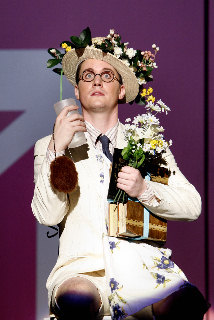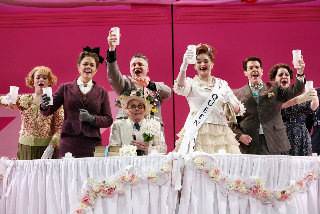|
Editor:
Marc Bridle
Webmaster: Len Mullenger
|
Seen and Heard International
Opera Review
Britten: Albert Herring: Soloists, Gotham Chamber Opera, Neal Goren (conductor), Gotham Chamber Opera, Harry de Jur Playhouse, New York City, 19.2.2006 (BH)
Conductor: Neal Goren Makeup Design: Hagen Linss
Cast
(in order of appearance): Florence Pike: Elizabeth Grohowski Albert Herring: Matt Morgan Cis: Madeline Weinstein Harry: Peter Goldsmith
With a cast list that could be from a P.G. Wodehouse
novel, Britten’s Albert Herring is equally light,
a soufflé of an opera that can rise or fall with the
slightest of ease. Britten and his librettist, Eric
Crozier, adapted a Guy de Maupassant short story, “Madame
Husson’s May King,” but lightened the story to conclude
with a more optimistic outlook for the title character.
The plot concerns a town’s unsuccessful search for a
May Queen, and the subsequent decision to choose a “May
King” instead, i.e., Albert Herring, who after
being chosen decides to make his escape, and returns
a changed and wiser man. This production by the Gotham
Chamber Opera was the first professional production
in New York in thirty years, and Britten’s piece is
ideal for the intimacy of the Harry de Jur Playhouse,
a venerable little theater on Manhattan’s Lower East
Side.
In Act II the May Day celebration gets into
full, riotous swing, with some of Britten’s most enticing
music – the opera is full of fresh, beautifully scored
set pieces – as Albert’s friends Sid and Nancy (strongly
sung by Timothy Kuhn and Leah Wool) spike his lemonade
with rum and sit back to watch the fun. As Albert,
Matt Morgan was a bespectacled look-alike for Matthew
Broderick in a constant state of embarrassment or surprise,
and should receive praise for some sweet and characterful
singing, while changing from a vulnerable gosling to
a more defiant adult. And as the three children, Cara Fesjian, Madeline Weinstein and Peter Goldsmith (all of the Met Children’s
Chorus) gave singing confident beyond their years, coupled
with wide-eyed charm.
Bruce Hodges
Photos © Gotham Chamber Opera
Back to the Top Back to the Index Page |
| ||
|
||||




